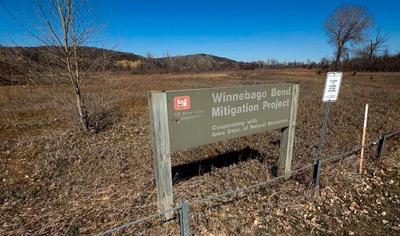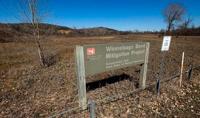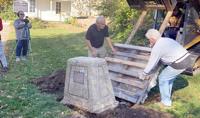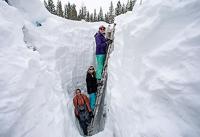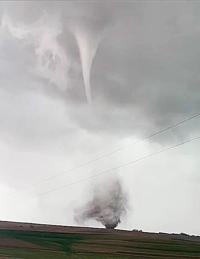SLOAN, Iowa — The Winnebago Tribe of Nebraska has come closer than ever to the long-sought return of two tracts of Missouri River-adjacent land seized by the government decades ago.
The Winnebago Land Transfer Act of 2023, introduced by Rep. Randy Feenstra of Iowa at the end of February last year, passed the House last month. An identical bill was introduced in the Senate in November by Nebraska Sen. Deb Fischer and co-sponsored by Iowa Sens. Chuck Grassley and Joni Ernst, and Nebraska Sen. Pete Ricketts.
The bill, under which the land would be held in trust by the United States for the benefit of the Winnebago Tribe, remains in the Senate, where it has been referred to the Committee on Indian Affairs.
“What was really cool is that we were able to see it pass in the House, and then, a couple days later, our chairwoman, Victoria Kitcheyan, testified to that Senate committee,” said Winnebago Tribal Communications Officer Garan Coons.
Shifting boundaries
The tracts, roughly 1,600 acres generally referred to as the Winnebago Bend and Snyder Bend, are situated largely in Woodbury County, with a smaller part in Monona County. The land lies near the tribe’s WinnaVegas Casino west of Sloan. One of the parcels is west and southwest of the casino along the Missouri River’s Winnebago Bend. The second area is northwest of the casino along Snyder Bend.
Originally the land was part of the Winnebago Reservation, created by treaty in 1865, and the land was in Nebraska, not Iowa. Over time, the Missouri River shifted, leaving some of the original reservation on the Iowa side of the border, including the Winnebago Bend and Snyder Bend land.
In the 1970s, the U.S. Army Corps of Engineers condemned Winnebago land on both the Nebraska and Iowa sides for riverbank stabilization and a planned recreation project. The recreation project never materialized, and the tribe won a federal court decision in Nebraska that stopped the condemnation there. The court found that federal law required that any acquisition of the tribe’s land must be done through a formal act of Congress.
But while the Nebraska land was given back, the Iowa tracts remained in the lurch. Efforts over the years to give the land back — including a 2017 effort spearheaded by then-Rep. Steve King to have the land transferred to the federal Bureau of Indian Affairs to be held in trust for the tribe — were not successful.
Officials respond
“After more than 100 years on the reservation, in 1975, the Army Corps of Engineers took portions of the land along the Missouri River away from the Winnebago Tribe,” Feenstra said in a statement.
“That’s why I introduced the Winnebago Land Transfer Act — which recently passed the U.S. House of Representatives — to make things right by returning the land to the Winnebago Tribe where it rightfully belongs. During this process, I’ve gotten to know many people in the Winnebago Tribe and have learned about the great work they are doing in agriculture, business and community development. From my conversations, the Winnebago Tribe plans to use this land for conservation open to the public, and I’m excited to see how they will not only improve the land, but also support our community.”
Under the corps’ management, the land has been used for wildlife conservation. Hunters of game and wild mushrooms have long favored the land, a relatively virginal stretch of trees, marshy grass and sand dunes. The 2017 attempt to give control of the land to the Bureau of Indian Affairs prompted concern that hunters would lose access to the ground, despite the tribe’s assurances that this would not happen; Tribal Councilman Isaac Smith said in 2017 that hunters “don’t have anything to worry about.”
New control
There will, of course, be a Winnebago conservation agency entering the mix if the land is transferred back to their stewardship. But except for the change in agency oversight in and of itself — a different jurisdiction handling hunting licenses and so forth — Coons said not much will change for hunters.
“We, as a tribe, here on the Nebraska side, have a Wildlife & Parks Department. And they’re gearing up to be one of the ones to oversee that,” Coons said. “And, to my understanding, everybody’s kind of anticipating that it’s going to pass, and so there’s a lot of agreements in place where the Iowa DNR is going to help out the Winnebago Wildlife & Parks Department, turn it over to them, and then they’ll have the staffing.”
There is one stipulation in the bill: The land cannot be used for casinos.
The return of the land enjoys broad support among senators of both Iowa and Nebraska.
“The decision to condemn and seize land from the Winnebago Tribe of Nebraska was a classic case of the government walking back on its promises,” Ernst said in a statement. “That’s why I’m fighting to right this wrong, place the 1,600 acres of Iowa-controlled land into a trust, and return it back to the Winnebago people.”
“The U.S. Army Corps of Engineers was wrong to seize this land through eminent domain in the 1970s. After decades of inaction, it’s time for us to make this right. My legislation will return this land to the Winnebago Tribe of Nebraska, and I look forward to getting this bill to the President’s desk,” Fischer said in a statement.
“I’ve had many conversations with the leaders of the Winnebago tribe over the years, and I’m confident returning this land back to the Winnebago people is the right move,” Grassley said in a statement.
Missing the action
There is one tribal leader who wanted very much to see the return of the land and who worked on it for many years, but won’t be able to see the fruits of these efforts: The late James “Louis” LaRose, who died in November at 81.
“He heard that it was going to go before the House, and then a couple days later he passed away,” Coons said. “And so, it was really cool to see that he was able to hear about it. But unfortunately he didn’t make it to see it being returned to the Winnebago Tribe.”

